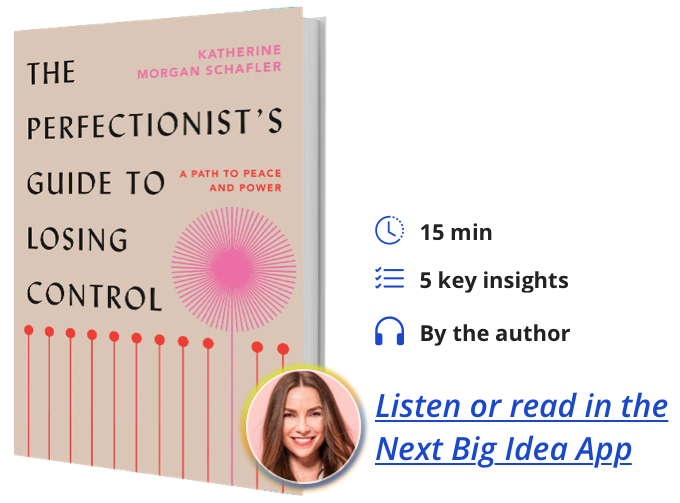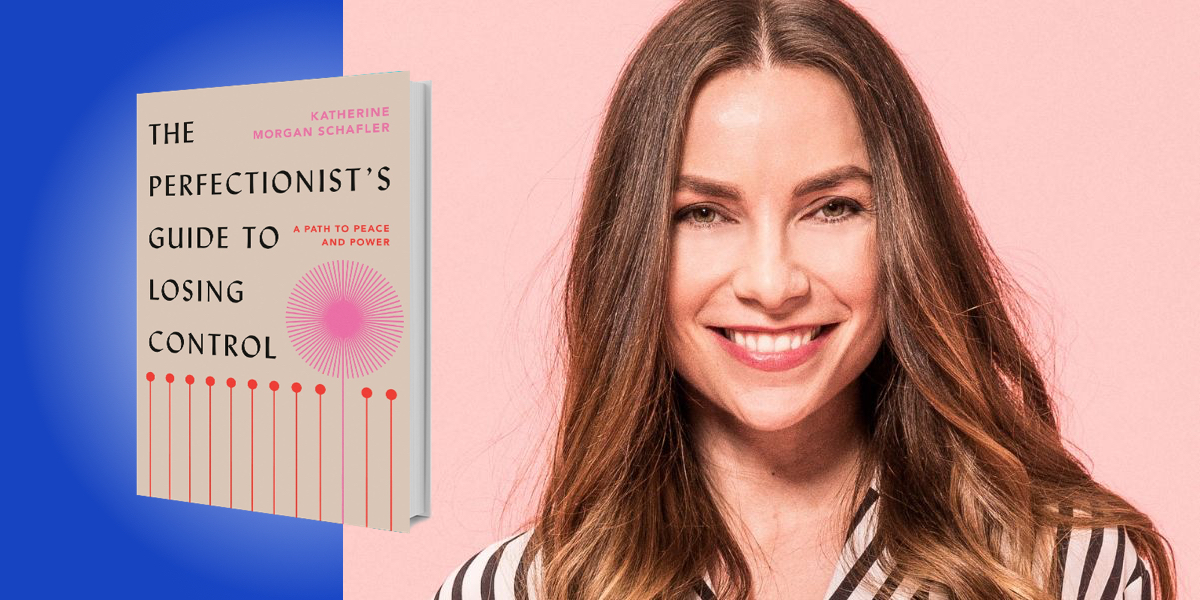Katherine Morgan Schafler, LMHC, is a psychotherapist and speaker. She was the former on-site therapist at Google. She earned degrees and trained at UC Berkeley and Columbia University, with post-graduate certification from the Association for Spirituality and Psychotherapy in NYC.
Below, Katherine shares 5 key insights from her new book, The Perfectionist’s Guide to Losing Control: A Path to Peace and Power. Listen to the audio version—read by Katherine herself—in the Next Big Idea App.

1. We’ve been looking at perfectionism all wrong.
We are in the infancy of understanding the kaleidoscopic force that is perfectionism. The more we try to nail down what perfectionism is, the more we allow ourselves to see that perfectionism doesn’t fit inside the little box into which we’ve been trying to squeeze it. With the capacity to be expressed both constructively and destructively, perfectionism is a natural human impulse that we animate through our thoughts, behaviors, feelings, and interpersonal relationships. Persisting across time and cultures, the universal desire to actualize the ideals we imagine is as healthy as the impulse to love, solve problems, make art, and tell stories.
In a world of commercial wellness, we continue to talk about perfectionism as if it’s an unnatural, exclusively bad thing, but it’s not. Perfectionism can be expressed in healthy ways, hence the decades old concept of “adaptive perfectionism” or using your perfectionism to your advantage. However, this concept has yet to break through the seal of academia and into mainstream dialogue. This means that everything you’ve heard about perfectionism isn’t actually about perfectionism itself, but about “maladaptive perfectionism.” “Maladaptive perfectionism” is the harmful and dangerous iteration of perfectionism and it’s stunning that we still don’t differentiate between these two aspects of perfectionism.
The way we currently approach perfectionism is like the low-fat craze in the 90s, when all fat was considered bad fat. Low-fat was good, fat-free was best. There was no distinction between the healthy fats found in avocados and the unhealthy trans-fats found in donuts. As our understanding of perfectionism develops, we’re abandoning generalized representations of the construct.
Perfectionism is a power, and like every kind of power—wealth, words, beauty, love—if you don’t understand how to harness it correctly, it will corrupt your life. But perfectionism, when managed well, is a gift. To unleash your gifts, you’ve got to stop solving for the wrong problem.
2. You’ve been solving the wrong problem.
Misidentify the problem, misidentify the solution. Your problem is not that you’re a perfectionist; some of the most joyful, extraordinary, fulfilled people in the world are perfectionists. Your problem is how you respond to your perfectionism. You’re either trying to eradicate it, or responding to it with punishment. Neither response will function.
The “eradication approach” simply does not work. Terrible pieces of advice that perfectionists often receive are “just lower your expectations a little bit” or “don’t sweat the small stuff.” Attempting to manage perfectionism by telling people to just not be perfectionists is like managing anger by telling people to calm down. Never in the history of the world has this approach ever worked, and yet it is a mainstay approach. So, maybe it’s time for a different approach.
“Thinking of yourself as a perfectionist is like thinking of yourself as an activist, an artist, or a romantic—it’s not an identity that you can just shake off.”
The “eradication approach” will also never work because thinking of yourself as a perfectionist is an enduring identity marker. We don’t talk about perfectionism episodically because we don’t experience it episodically. For example, a person may say something like, “I went through a depression after college,” but we don’t “go through” perfectionism. Perfectionism is experienced in a deep and visceral way. Thinking of yourself as a perfectionist is like thinking of yourself as an activist, an artist, or a romantic—it’s not an identity that you can just shake off.
Perfectionists never stop noticing the gap between reality and the ideal, and they never stop longing to actively bridge that gap. The noticing and the longing last a lifetime, hence the psychical constancy to perfectionism. People who relate to being perfectionists tend to relate to that identity interminably. Trying to get rid of your perfectionism is like trying to get rid of the wind by whacking it with a broom. Perfectionism is too powerful for the “eradication approach.” When you try to get rid of your perfectionism, all you’re doing is hemorrhaging energy at the opportunity cost of attending to your wellness.
3. Punishment is a dumb strategy and makes everything worse.
Self-punishment is consciously or unconsciously returning to something that you know will hurt you, or denying yourself something that you know will help you. Punishments are designed to create more pain. When you’re punitive with yourself, the grand plan is to hurt yourself in order to teach yourself a lesson. You punish yourself “for your own good,” creating pain for yourself as a strategy for learning, growth, and healing.
But punishment doesn’t work. When you punish someone (including yourself), that person doesn’t learn how to change; they learn how to avoid the source of the punishment. If you’re the source of the punishment (through critical self-talk, for example), then you learn to avoid yourself by numbing out. Numbing out looks like overeating, overspending, overworking, getting caught up in drama as a distraction tactic, substance misuse, mindlessly watching TV, etc. Doing all of that stuff keeps you in pain and keeps you stuck. People often think they’re stuck in a cycle of watching too much TV or overworking or overdrinking. After digging a little deeper, however, they see that what they’re stuck in is a cycle of self-punishment.
You don’t heal yourself by hurting yourself. To sustain any kind of personal growth, you need to uncover the lessons of your past mistakes. Understand what the healthier alternatives are, and believe that you’re capable of change in the first place. Punishment doesn’t seek to do any of that. Punishment is lazy; it just lays pain on top of whatever’s there.
The reason we don’t recognize the dysfunctional nature of punishment is because we live in a culture that broadcasts and actively promotes punishment as the go-to response for unwanted behavior. In this retributive rather than restorative culture, it makes sense that you’ve internalized punishment as your first line of defense against the qualities you don’t like seeing in yourself. What doesn’t make sense is for you to continue using punishment as an agent for positive change.
Look at punishment up close and you will see desperation. When we feel desperate and out of touch with power, we grasp onto punishment to feel in control. Feeling in control is not a substitute for empowerment.
4. Self-compassion is a brilliant strategy and makes everything better.
Perfectionists hear the directive to be more compassionate with themselves as the fluffy warm-up to the actual advice, but self-compassion is the real solution. They’re confused because they’re operating with a majorly watered-down idea of what self-compassion is in the first place. Self-compassion is not telling yourself, “It’s okay,” when things are not okay. Nor is self-compassion simply being polite to yourself, or talking to yourself as you would a friend.
“Responding to stress with self-compassion is one of the most effective and powerful coping mechanisms available to us.”
According to Dr. Kristen Neff, a pioneer in self-compassion research, self-compassion is a three-step resiliency-building skill. Responding to stress with self-compassion is one of the most effective and powerful coping mechanisms available to us. Self-compassion bolsters well-being across the board: it improves your physical, mental, and relational health.
Mindfulness, common humanity, and kindness; that’s the trifecta that makes up a self-compassionate response. We don’t have emotional education in schools, so we don’t know what mindfulness really means—or common humanity, for that matter. That doesn’t mean we can’t take it upon ourselves to learn. The more you practice the skill-set of self-compassion, the more your life will change.
Being compassionate with yourself does not have to be a total personality overhaul to be effective. The amount of compassion you extend to yourself is not commensurate to the amount of healing that will unfold as a result. Giving yourself a little bit of compassion is like lighting a candle in a dark room; that tiny flicker goes a long way to brighten the entire space. Self-compassion can be a feather’s weight more grace to yourself, or simply five extra seconds.
5. You are perfect.
Yes, perfect. Not “perfectly imperfect,” not “good enough,” you are perfect. It’s sad and strange how defensive we become about being called perfect. We feel righteously entitled to our defensive posture, so much so that we immediately feel comfortable rejecting the categorization out loud. Meanwhile, we rarely defend ourselves when someone needles us with a criticism or a judgmental remark.
The word “perfect” comes from the Latin “perficere,” per (completely) and ficere (do). Something considered perfect is that which is completely done; it exists in a state of completion, wholeness, perfection. When we describe something as perfect, what we’re saying is that there’s nothing we would add to it to make it better. Nothing more is needed because you can’t add to something that’s already whole.
Think of someone you love. Now think of the sound of that person’s laughter. Is that sound not perfect? There’s nothing you could change about that laughter to make it better; it’s already complete, it’s already whole. When you say someone is a “perfect stranger,” you’re not saying they’re a flawless stranger, you’re saying they’re a complete stranger to you.
“Joy, love, dignity, connection, and freedom, these are birthrights, not prizes to be won through achievement sprees.”
You’re not flawless, none of us are, but you are a whole human being, right now. The things you do don’t make you whole, you’re born with your wholeness. We so effortlessly acknowledge perfection in children, nature, or our best friends, and yet we deny it in ourselves. What if we didn’t? What would happen if we understood deeply that we’re not broken, we’re whole? That we’ve always been whole. That we don’t have to fix anything to be ready for life. That we can just show up, now.
Once you understand that chasing perfection is about trying to access wholeness, it changes everything about the way you see and respond to your perfectionism. If you can learn to see yourself as a whole and perfect human being, you understand that you are as worthy of all the love, joy, dignity, freedom, and connection as the best, most complete, most well-accomplished human being could ever deserve.
Perhaps most importantly, you learn that you don’t earn your way to joy. You stop making excellent plans to be happy later. You give yourself free access to goodness now, in the way of joy, pleasure, and your own care and attention, instead of waiting to see how well you perform to calculate how much goodness you deserve. Joy, love, dignity, connection, and freedom, these are birthrights, not prizes to be won through achievement sprees; you deserve them now, this very second, not because you’re performing well, but because you are alive.
There’s wholeness inside of you; there’s perfection, completeness, and there’s freedom. There’s a place where your mistakes can’t touch who you are and where the past simply does not matter. That indestructible part of you in a den deep inside, what some people might call God, there’s nothing you can do to break that apart. If you can connect to that place inside of yourself, you will connect to your power. When you’re in touch with your power, you don’t need control.
To listen to the audio version read by author Katherine Morgan Schafler, download the Next Big Idea App today:
































